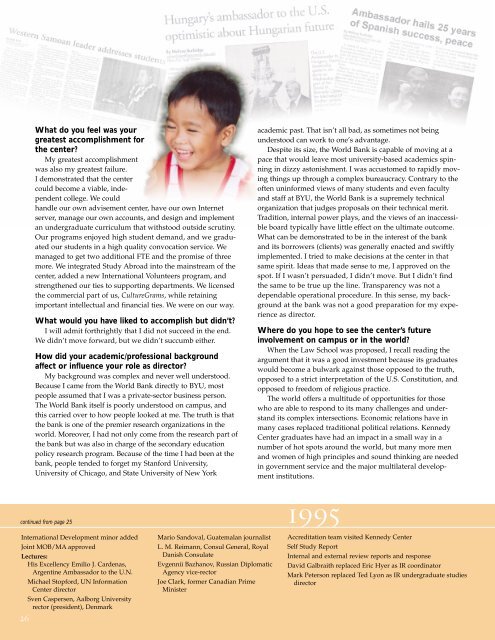BRIDGES - Kennedy Center - Brigham Young University
BRIDGES - Kennedy Center - Brigham Young University
BRIDGES - Kennedy Center - Brigham Young University
You also want an ePaper? Increase the reach of your titles
YUMPU automatically turns print PDFs into web optimized ePapers that Google loves.
What do you feel was your<br />
greatest accomplishment for<br />
the center?<br />
My greatest accomplishment<br />
was also my greatest failure.<br />
I demonstrated that the center<br />
could become a viable, independent<br />
college. We could<br />
handle our own advisement center, have our own Internet<br />
server, manage our own accounts, and design and implement<br />
an undergraduate curriculum that withstood outside scrutiny.<br />
Our programs enjoyed high student demand, and we graduated<br />
our students in a high quality convocation service. We<br />
managed to get two additional FTE and the promise of three<br />
more. We integrated Study Abroad into the mainstream of the<br />
center, added a new International Volunteers program, and<br />
strengthened our ties to supporting departments. We licensed<br />
the commercial part of us, CultureGrams, while retaining<br />
important intellectual and financial ties. We were on our way.<br />
What would you have liked to accomplish but didn’t?<br />
I will admit forthrightly that I did not succeed in the end.<br />
We didn’t move forward, but we didn’t succumb either.<br />
How did your academic/professional background<br />
affect or influence your role as director?<br />
My background was complex and never well understood.<br />
Because I came from the World Bank directly to BYU, most<br />
people assumed that I was a private-sector business person.<br />
The World Bank itself is poorly understood on campus, and<br />
this carried over to how people looked at me. The truth is that<br />
the bank is one of the premier research organizations in the<br />
world. Moreover, I had not only come from the research part of<br />
the bank but was also in charge of the secondary education<br />
policy research program. Because of the time I had been at the<br />
bank, people tended to forget my Stanford <strong>University</strong>,<br />
<strong>University</strong> of Chicago, and State <strong>University</strong> of New York<br />
continued from page 25<br />
International Development minor added<br />
Joint MOB/MA approved<br />
Lectures:<br />
His Excellency Emilio J. Cardenas,<br />
Argentine Ambassador to the U.N.<br />
Michael Stopford, UN Information<br />
<strong>Center</strong> director<br />
Sven Caspersen, Aalborg <strong>University</strong><br />
rector (president), Denmark<br />
26<br />
Mario Sandoval, Guatemalan journalist<br />
L. M. Reimann, Consul General, Royal<br />
Danish Consulate<br />
Evgennii Bazhanov, Russian Diplomatic<br />
Agency vice-rector<br />
Joe Clark, former Canadian Prime<br />
Minister<br />
academic past. That isn’t all bad, as sometimes not being<br />
understood can work to one’s advantage.<br />
Despite its size, the World Bank is capable of moving at a<br />
pace that would leave most university-based academics spinning<br />
in dizzy astonishment. I was accustomed to rapidly moving<br />
things up through a complex bureaucracy. Contrary to the<br />
often uninformed views of many students and even faculty<br />
and staff at BYU, the World Bank is a supremely technical<br />
organization that judges proposals on their technical merit.<br />
Tradition, internal power plays, and the views of an inaccessible<br />
board typically have little effect on the ultimate outcome.<br />
What can be demonstrated to be in the interest of the bank<br />
and its borrowers (clients) was generally enacted and swiftly<br />
implemented. I tried to make decisions at the center in that<br />
same spirit. Ideas that made sense to me, I approved on the<br />
spot. If I wasn’t persuaded, I didn’t move. But I didn’t find<br />
the same to be true up the line. Transparency was not a<br />
dependable operational procedure. In this sense, my background<br />
at the bank was not a good preparation for my experience<br />
as director.<br />
Where do you hope to see the center’s future<br />
involvement on campus or in the world?<br />
When the Law School was proposed, I recall reading the<br />
argument that it was a good investment because its graduates<br />
would become a bulwark against those opposed to the truth,<br />
opposed to a strict interpretation of the U.S. Constitution, and<br />
opposed to freedom of religious practice.<br />
The world offers a multitude of opportunities for those<br />
who are able to respond to its many challenges and understand<br />
its complex intersections. Economic relations have in<br />
many cases replaced traditional political relations. <strong>Kennedy</strong><br />
<strong>Center</strong> graduates have had an impact in a small way in a<br />
number of hot spots around the world, but many more men<br />
and women of high principles and sound thinking are needed<br />
in government service and the major multilateral development<br />
institutions.<br />
1995<br />
Accreditation team visited <strong>Kennedy</strong> <strong>Center</strong><br />
Self Study Report<br />
Internal and external review reports and response<br />
David Galbraith replaced Eric Hyer as IR coordinator<br />
Mark Peterson replaced Ted Lyon as IR undergraduate studies<br />
director


